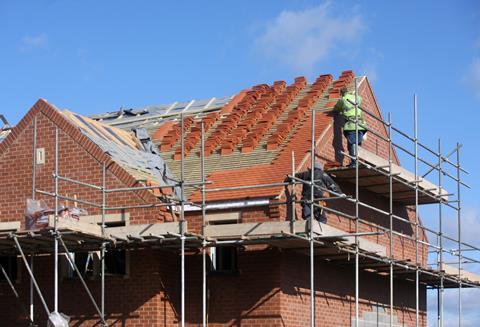NHBC chief executive says figures may not fully recover from the pandemic until 2023
Housing starts are likely to remain between 10 and 15% below 2019 levels this year, despite builders’ strong recovery from the coronavirus pandemic, according to the NHBC.
Steve Wood, chief executive of the housing sector’s biggest warranty provider, said “registrations” of new homes to the NHBC – which indicate an imminent start on site – were likely to remain 10-15% below the level seen in 2019 because of continued market uncertainty. He predicted that they would not fully recover until 2023.

Wood made the comments as the NHBC released full-year figures for 2020 showing registrations and build completions in the UK both sharply down on 2019 due to the disruption stemming from the pandemic.
The NHBC figures show both completions and registrations fell by 23%, with just 123,121 homes registered, the lowest level since 2012, and 115,445 homes completed. Work on private housing for sale was more impacted than work on homes for rent.
However, the NHBC said that, after a dramatic fall in housebuilding work in the spring, the post lockdown recovery was such that in the last quarter of 2020, registrations were just 2% down on the fourth quarter of last year.
The NHBC is estimated to provide warranties for 70-80% of all new homes so, while its figures do not give a full picture of every house built, they give a strong indication of trends in the market.
Wood said: “There is no certainty in this world, but what we would expect is our registrations [this year] to be about 10-15% up on 2020, and about 10-15% down on 2019.
“We would expect further growth in volumes as we go in to 2022, which should be stronger, [and] certainly by 2023 we should be at least at the levels of 2019 and hopefully above that.”
Wood said the overall market outlook was positive, and the extent of the falls in output last year showed that the sector had been to a large degree protected from the worst impacts of the pandemic.
When covid-19 first struck, the Construction Products Association had predicted that starts would fall by more than 60% in 2020, much more than ultimately occurred.
Wood also played down the impact of construction material shortages seen in the wake of the ending of the Brexit transition period at the start of January. He said that shortages of imported plaster-based materials, and some white goods and sanitary goods had been experienced. But these were “sorting themselves out” and looked to be “manageable”.
He said the NHBC had seen growth in interest in the use of modern methods of construction to build homes, but that the volume of homes constructed using this route – excluding open panel timber-frame buildings – was still below 5% of the total in 2020.










No comments yet